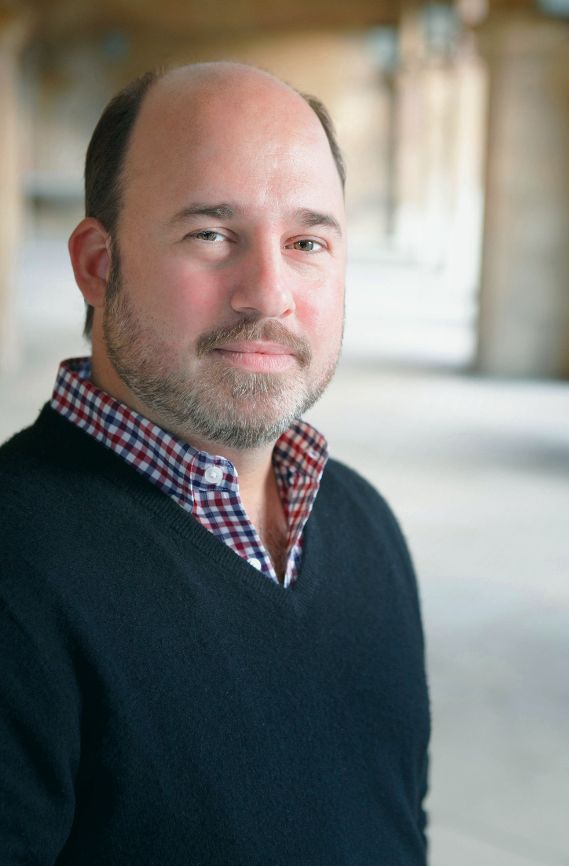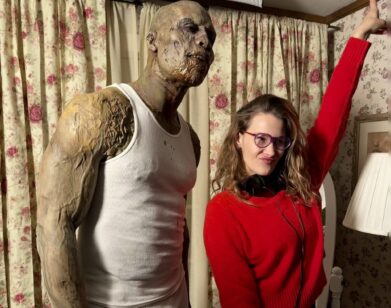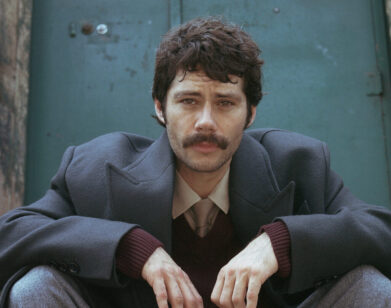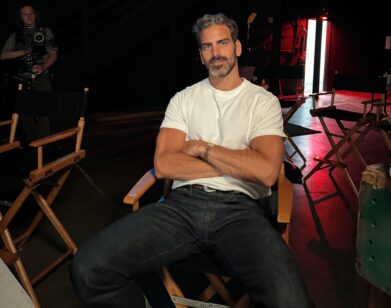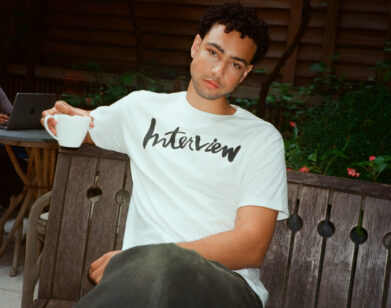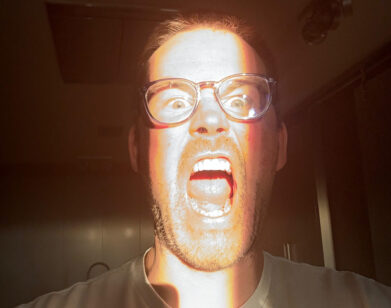Toppling the Ivory Tower
For filmmaker Andrew Rossi, making documentaries is “an exercise in filmmaking that includes journalism,” not the other way around. His latest film, Ivory Tower, is a staggering look at the spiraling debt and tuition costs that have become synonymous with going to college in America. In Rossi’s words, “the idea that college is a vehicle for social mobility is now being threatened because of student debt.”
Famous for films such as Page One: Inside The New York Times (2011) and Eat This New York (2004), Rossi is a law school grad from an immigrant family who benefitted from the very American dream that’s threatened today. The chasm between a time when college could be paid off with summer jobs and the reality of America’s trillion-dollar student debt today is, if nothing else, foreboding. Ivory Tower is half startling 60 Minutes report, half Social Network youth-in-rebellion and, with a score from Passion Pit’s Ian Hultquist, the contrast between the two is genuinely edge-of-your-seat exciting.
A project about mental illness and an HBO feature on crime are in store for the future, but we spoke with Rossi in anticipation of Ivory Tower about the sustainability of the American college system and his 18-year-old aspirations.
KENZI ABOU-SABE: I wanted to start off—why education? Why this subject?
ROSSI: I have always been drawn to stories that are about disruption, that show a really important cultural institution at a crossroads. I did that with my last film, which was about the New York Times and more broadly the crisis in the newspaper industry, and when I completed that film, it was a moment when people were focusing on the changes in higher education, including student loan debt, which was exceeding a trillion dollars. Peter Thiels was calling to have people drop out and start a company instead of going to school. So I felt that it was an ideal moment to go on the ground and film the experiences that students and educators were having in order to understand better what type of disruption might be needed and what is already happening in the sector.
ABOU-SABE: So how did you guys choose which colleges you would profile?
ROSSI: We wanted to really represent, as much as possible, a range of educational experiences. We looked at Harvard as the first university, which is also, as Clayton Christensen describes in the film, the paragon that many other schools are modeling themselves after, and don’t always have the same endowment to sustain the kind of growth and investment that is necessary to emulate Harvard. Or maybe are doing so in a way that is leading to an inflation of tuition that is not helping the health of the whole sector. Then we look at Arizona State University as an example of the public university experience, which is supposed to be a school that takes a wide range of students—it’s not a selective admissions university. [ASU President] Michael Crow has an interesting perspective of the new American university, which is one that does have honor students, and students that require more guidance throughout their stay in college. So we wanted to see what the experience was there. Obviously we look at the historically black college Spelman as an example of great spiritual and personal development that can occur in college. And Deep Springs College as a real contrast to the consumerist model, or corporatist model, that’s taken over the university, and in some cases leads students, because they’re paying so much money, to feel entitled to be treated as consumers that are getting services. As a contrast, the Deep Springs students are governing themselves.
ABOU-SABE: I didn’t know anything about Deep Springs before watching the film. Did you develop your own opinion, while you were creating this, of which education model you think is better? The selective education where everyone is vaguely of the same GPA, or the ASU model where it’s more of a range, and people are there for different reasons—the state students are there because it’s a cheap and it’s a good education, and the out of state students are there because it’s a great time.
ROSSI: I feel like the two aren’t necessarily mutually exclusive. Both of them have merits, and I think the biggest issue is about how you pay for it, wherever you go. In many cases the prices are really quite similar, and that’s disturbing. The main issue I think is managing your debt. So I feel like the ability for students to have a really meaningful experience in college is clear, the problem is, if you’re paying so much, does that sort of create perverse incentives while you’re at school, and also prescribe your options once you graduate?
ABOU-SABE: Were there any other schools you looked at that got cut in editing?
ROSSI: We did film quite a bit at UVA, and we weren’t able to fit that material in. We shot much more at Wesleyan also. We shot with the [online learning] program, Coursera, which is like Udacity.
ABOU-SABE: What’s your opinion on those Internet learning programs?
ROSSI: I think Internet learning, the use of technology in the classroom, is really important and powerful, but it needs to be coupled with an in-person component, an instructor to help explain things and to encourage students. That’s why the Bunker Hill Community College model you see at the end of the movie, which represents a flipped classroom—the lectures are done online and students go into class to do their homework—is really effective.
Even something as simple as the teacher patting someone on the back is the physical touch that you just can’t have online. When you see some of the comments from the students of San Jose State University who took the Udacity pilot course for remedial algebra, you see them saying “my confidence is shattered,” “this was totally maddening and ambiguous,” a small interaction with an instructor that’s in person could go a long way in addressing those issues.
ABOU-SABE: How did you find the students that you highlighted?
ROSSI: We were on the ground at Harvard for a good amount of that first semester in the 2012-2013 academic year. And we followed many students, and then found David Boone and continued to film with him. He’s the African American student who was at one point homeless before he came to Harvard. We thought his story was really emblematic of some of the great potential that higher education has as an engine of social mobility. We went to the UnCollege program in San Francisco and found different students there, including its founder Dale Stephens, who’s an alumnus of the Peter Thiel 20 Under 20 Fellowship program. So he was another person we wanted to follow. Then Victoria Sobel, who is the leader of the movement at Cooper Union, she’s somebody who was not on our radar at all until the occupation began. We were on the West Coast when that event took place, and when we came back to New York we went right to Greenwich Village where Cooper Union is located. I had seen her on Democracy Now! talking about the plight at Cooper Union and she’s very recognizable with her dyed hair, so we just starting talking to her and realized she was a student wise beyond her years. She had this really resilient spirit and sense of mission with everything she was doing.
ABOU-SABE: How far into filming were you guys when the Cooper Union occupation happened?
ROSSI: We were about three-quarters of the way done with production. We were shooting and editing pretty much simultaneously, so I think we came upon Victoria and the Cooper Union story at the end of April, maybe even in May, and we were at Sundance the next January.
ABOU-SABE: When you interview subjects do you have an idea in your head of the answer you want from them, or does the rhyme and reason of it all come when you’re editing?
ROSSI: I would say the latter. In this film I shot with two other camera people, but typically it’s just me shooting, and so I’m always thinking of all the other material we have in the film, and how something kind of fits into it. That helps, that sort of informs the shoot. I think ultimately, it’s in the edit, when the editors are putting together the story, that it kind of becomes clear whether something is going to make it in there or not.
ABOU-SABE: I know you didn’t have a camera crew when you did Page One: Inside The New York Times.What was different this time around?
ROSSI: When I was filming Page One I was in the newsroom, and there was always a sense that I didn’t want to get in the way of peoples’ work. I wanted to have as small a footprint as possible. It certainly was important not to disrupt the classroom setting while filming Ivory Tower, but there was a little more leeway, there was a little more flexibility, so I was able to have a second shooter. There were three cinematographers total, but Brian [Sarkinen] who’s the other shooter, would come to sit down interviews that we did with the university presidents and those sort of formal situations, and otherwise it was just myself and Andrew Coffman shooting the vérité scenes, I guess you could call them.
ABOU-SABE: I really liked the music in the film. I felt like it reflected the sort of anxiety of the education bubble. It was making me panic as I was watching it. What ideas did you have about that?
ROSSI: Yes, so Ian Hultquist who did the music, and who’s a fantastic guy, he’s a member of the band Passion Pit.
ABOU-SABE: Oh, awesome.
ROSSI: Do you know Passion Pit?
ABOU-SABE: Yeah, I didn’t realize that was him.
ROSSI: This is the first feature film that he’s scored and it’s kind of his passion to score movies so that’s what he’s focusing on now. We had a couple of reference points, we looked at The Social Network as one inspiration, and there are also a handful of licensed songs that appear in the film, from Radiohead to Beach House and Tame Impala. It’s hopefully a range of music that captures what young people, or people in college, would listen to, and it’s also hopefully the idea that some of the music is a contrast to some of the grand institutional settings. You know, like the wood paneled libraries, and the ivory tower.
ABOU-SABE: Would you ever direct a fiction feature?
ROSSI: That’s definitely something that I’m interested in. I actually participated in this IFP [Independent Filmmaker Project] lab for screenplay writers, and I wrote a screenplay with Kate Novack that got into that lab. We’ve talked about it, but documentary is my first love, so that’s what I’m focusing on.
ABOU-SABE: So what did you want to be at 18?
ROSSI: I wanted to be a storyteller and to work in film, or theater even. I’m the first in my family to go to college in the U.S. My parents were immigrants, so I’m the first generation to be an American citizen, and they always felt it was really important to get a good education and have a solid professional background, so I went to law school right after college. I think in many ways, because of their inspiration. Or prodding. [laughs] So I knew that I wanted to do something creative, but then I ended up doing something more professional.
ABOU-SABE: I’m first generation too. It’s funny how it really doesn’t matter where you come from, as long as you come from an immigrant family, college is the number one thing your parents want for you.
ROSSI: Exactly.
ABOU-SABE: If you were 18 today and faced with the decision of going to college or going into the workforce, knowing what you know now, would you choose college or work after high school?
ROSSI: I think for the majority of young people who are engaged in their education but don’t necessarily know what they want to do yet, college can be a fantastic vehicle for them to learn more about themselves and a range of topics in order to decide what they want to focus on when they graduate. But I would advise that those people need to take their time in college very seriously, and not only sort of have fun while they’re there. But then there are those who know that they want to do something different, that does not necessarily require a BA, and I think those students, who can be very capable, should get more support to opt out of going to college. I think that statistically there are much fewer students, or people, who are both gifted, and also already so self-directed.
ABOU-SABE: Are you glad that you took the route that you did?
ROSSI: Yes, I am. I’m very happy in terms of where I ended up, and I think that all the experiences that I had sort of made me who I am today, and I’m happy with that.
IVORY TOWER COMES OUT IN SELECT CITY THIS FRIDAY, JUNE 13.

